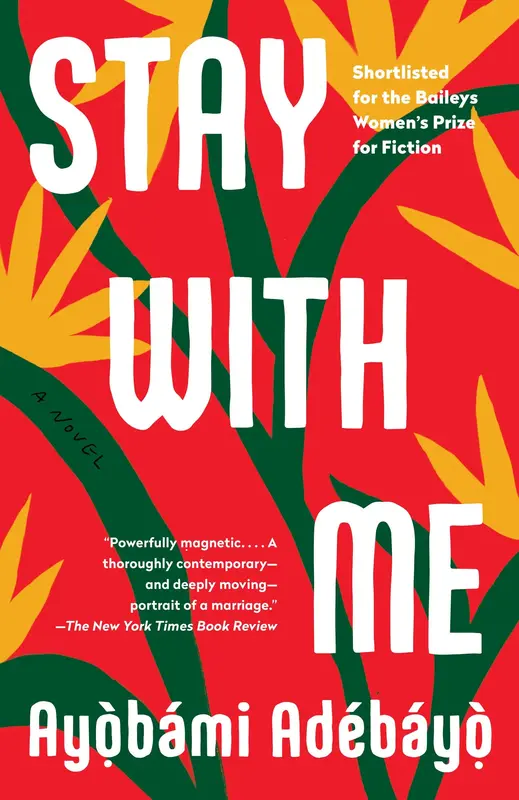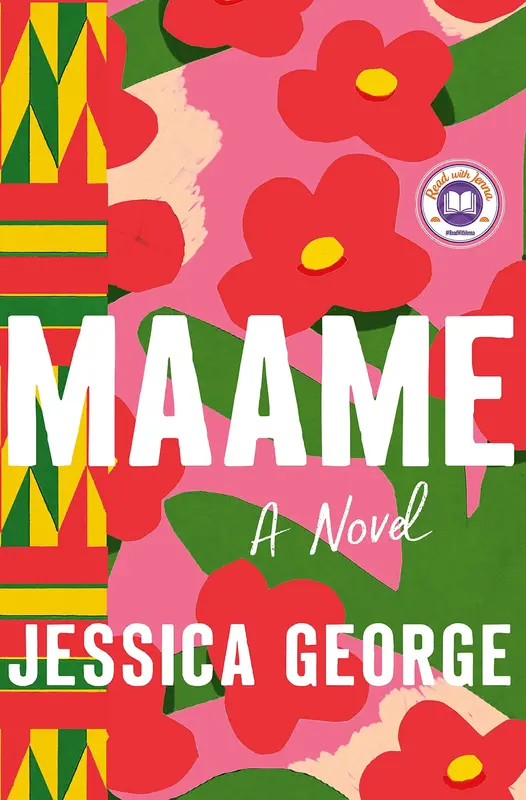This post may contain affiliate links. Read more here.
Book club questions for “A Spell of Good Things” by Ayobami Adebayo explore the themes of love, abuse, tradition, and the experiences of Nigerian women.
The novel follows Wúràọlá, a Nigerian woman who struggles to navigate an abusive relationship with her partner Kúnlé while dealing with the pressures of her cultural and familial expectations. Through Wúràọlá’s story, the novel also sheds light on the experiences of other women in Nigeria, such as Yèyé and Ìyá Ẹniọlá, who are trapped in unhappy marriages due to societal and cultural norms.
Along with examining the forces that keep women in abusive and unsatisfying relationships, the novel also explores the experiences of men trying to live up to patriarchal standards of masculinity. Against the backdrop of Nigerian culture and tradition, Wúràọlá must find the strength to confront her situation and stand up for herself.
Adébáyọ̀’s writing style in “A Spell of Good Things” is lyrical and evocative, weaving together the traditions and values of the Yoruba people with a contemporary story of love, abuse, and resilience. As we follow Wúràọlá’s journey, we are challenged to grapple with complex questions about gender, power, and the bonds that tie us to our families and communities.
Are you looking to host a thought-provoking book club discussion for “A Spell of Good Things“? Look no further! In this post, you’ll find a set of insightful book club questions that will help you explore the novel’s themes and motifs in depth. From the dynamics of abusive relationships to the changing roles of men and women in Nigerian society, these questions will spark lively conversations and thoughtful reflections.
So pour yourself a cup of tea, settle in with the book, and prepare to immerse yourself in the world of Wúràọlá and her family. Share your own interpretations and perspectives in a vibrant and engaging book club session, delving into questions of tradition, identity, and the power of love and resilience.
The Synopsis
Eniola is tall for his age, a boy who looks like a man. Because his father has lost his job, Eniola spends his days running errands for the local tailor, collecting newspapers, begging when he must, dreaming of a big future.
Wuraola is a golden girl, the perfect child of a wealthy family. Now an exhausted young doctor in her first year of practice, she is beloved by Kunle, the volatile son of an ascendant politician.
When a local politician takes an interest in Eniola and sudden violence shatters a family party, Wuraola’s and Eniola’s lives become intertwined. In her breathtaking second novel, Ayọ̀bámi Adébáyọ̀ shines her light on Nigeria, on the gaping divide between the haves and the have-nots, and the shared humanity that lives in between.
In love with literature? Try audio books or writing classes
for free for 30 days.✨
Selected Reviews for A Spell of Good Things
“Adébáyọ̀ shines a light on modern Nigeria in this dynamic political novel, crafting a dazzling tale of wealth and love in the process.” —Chicago Review of Books
“A moving story, skillfully told, about Eniola, a boy whose future has been snatched away from him, and Wuraola, a talented, overworked junior doctor, whose intertwined narratives combine to produce an insightful portrait of an unequal and deeply divided society moving towards a terrible crisis. A Spell of Good Things is both gripping and memorable.” —Pat Barker, award-winning author of The Silence of the Girls and The Women of Troy
“Adebayo is a gifted storyteller, and like her debut novel, Stay with Me, her second book does not disappoint. The thin line between the poor and the wealthy is decimated when the lives of Eniola, an errand boy for a tailor, and Wuraola, a physician, collide. The violence of elections and the empty promises of politicians, the obscene wealth of the connected, the hunger and desperation of the have-nots all intersect in this examination of a community in Nigeria.” —Oprah Daily
“Adébáyọ̀…has a sprightly writing style that’s pleasurably at odds with the devastating story she tells. She captures the almost musical speech patterns of her characters and doesn’t trouble to translate snatches of Nigeria’s many languages. The novel’s cast is large, but each character is distinct….A Spell of Good Things is a wonderfully written, tragic book.” —Arlene McKanic, BookPage
“Ayọ̀bámi Adébáyọ̀ is a natural storyteller, a spellbinder. Her expansive second novel is Dickensian in scope and execution. It sparkles.” —Helon Habila, author of Travelers
Book Club Questions for A Spell of Good Things
Spoiler alert: my book club questions may contain spoilers, so make sure to discuss them after you’ve finished reading.
1. The novel depicts the vast economic divide between the haves and the have-nots in Nigeria, and how the former’s wealth can be manipulated to maintain power and influence. Discuss how the author portrays this theme through the experiences of Eniola and Wuraola, and how it resonates with similar economic disparities in other countries around the world.
2. Aunty Caro plays a significant role in the lives of both Ẹniọlá and Wúràọlá’s families, and the novel both opens and closes with her presence. Reflect on the significance of Aunty Caro’s connection to these families and what this relationship represents. What larger themes does it illustrate, and why do you think Adébáyọ̀ chose to frame the novel in this way?
3. A SPELL OF GOOD THINGS is a deeply introspective novel that delves into the complexities of abusive relationships and the societal forces that keep women in them. In the book, we witness Wúràọlá’s experiences of abuse at the hands of Kúnlé, and we see the challenges she faces in coming forward with her story. What underlying forces prevent her from disclosing the abuse to her friends and family, and how do her sister Mọ́tárá and her friends react to her situation? Were their responses helpful or did they fail to fully understand the gravity of her circumstances? Furthermore, how do the reasons for Wúràọlá’s staying in her abusive relationship compare to the motivations provided by Yèyé and Ìyá Ẹniọlá for staying in their own unhappy marriages?
4. As you reflect on the novel’s structure, take a closer look at the four epigraphs that begin each part of the story. How do these quotes amplify the themes explored in the book and establish a distinct tone for each section? Consider the works of T. M. Aluko, Chika Unigwe, Helon Habila, and Teju Cole, and reflect on how they engage in dialogue with Ayọ̀bámi Adébáyọ̀’s novel. What unique perspectives do they bring to the text, and how do they intersect with Adébáyọ̀’s own ideas? Why do you think Adébáyọ̀ selected these quotes as essential components of the novel’s architecture?
5. The novel also offers insights into the struggles faced by men who are trying to reconcile their own beliefs about masculinity with the changing societal norms around gender roles and the empowerment of women. How do the male characters in the novel, including Ẹniọlá, Láyí, and Kúnlé, react to the changing dynamics of gender roles and the place of women in society? Moreover, what differences do you observe between the older generation and the younger generation in terms of their attitudes toward gender roles and women’s empowerment?
6. Yèyé’s 50th birthday party is a pivotal moment in the novel, and it is marked by a complex mix of emotions. Reflect on the tone of the party and the different reactions it elicits from the characters. How does this moment reflect the tensions and challenges of contemporary Nigerian society, and what larger themes does it illustrate? What was your personal reaction to the ending of the party and what it suggests about the characters and their relationships?
7. The book raises questions about the role of education in society and how it can either perpetuate or challenge existing power structures. Discuss how the character of Eniola, who desires an education despite the obstacles he faces, highlights the importance of equal access to education, and how the novel speaks to broader issues of systemic inequality in education worldwide.
8. Ẹniọlá’s mother is faced with a difficult decision regarding which of her children to prioritize for further education. What factors influence her choice, and do you agree with her decision? What does this moment reveal about the complex trade-offs that parents must make in a society where opportunities are limited and difficult choices are commonplace?
9. In A SPELL OF GOOD THINGS, Kingsley emerges as a significant figure in Wúràọlá’s life as she navigates her relationship with Kúnlé. What qualities and characteristics define Kingsley, and how does he offer a counterpoint to Kúnlé’s abusive behavior? Additionally, what is the significance of Kingsley’s presence in Wúràọlá’s life at this critical juncture, and how does it shape the course of the narrative?
10. The book explores the concept of fate and destiny through the struggles and hardships of Eniola and Wuraola, whose lives become intertwined after a family party ends in violence. Analyze how the characters’ choices and actions shape their paths, and how their cultural and societal backgrounds affect their sense of agency and control over their lives.
11. The novel is set against the backdrop of modern-day Nigeria, and touches on a number of political and social issues impacting the country, including corruption, economic inequality, and the legacy of colonialism. How does Adébáyọ̀ weave these themes into the story, and what impact do they have on the characters and their relationships?
12. Despite their disparate socioeconomic backgrounds, both Ẹniọlá and Wúràọlá’s families place a high value on education. Reflect on why education is such an essential asset in this society and explore how it shapes the characters’ lives and relationships. Do you think the emphasis on education ultimately helps or hinders the individuals in the story? How do different characters’ experiences with education inform their perspectives on the world and their place in it?
13. The book is steeped in the language, traditions, and values of the Yoruba people in Nigeria. How does this cultural context contribute to the story and enhance your reading experience? In what ways does the Yoruba culture enrich the themes of the book, particularly those related to relationships, family, and societal norms? Why do you think it was important for Adébáyọ̀ to tell this story using a cultural lens?
14. In the novel, the theme of marriage is explored through the lens of various characters from different social classes and cultural backgrounds. Wúràọlá describes her engagement as a celebrity, implying that marriage is not only a personal union but also a public display of one’s social status. How do the reactions to Wúràọlá’s engagement reveal the cultural significance of marriage in Nigeria? How does the emphasis on marriage as a symbol of prestige or status affect the characters in the novel, particularly those from lower socioeconomic backgrounds? To what extent do love, cultural customs, and social class shape partnerships in this society, and how do they impact the characters’ views on marriage?
15. The theme of sisterhood is central to the novel. In what ways do the sisters support and challenge each other throughout the story? How does their relationship evolve over the course of the book, and what does it ultimately say about the importance of female bonds?
16. As you consider the novel’s multifaceted exploration of class, education, family, gender, marriage, and domestic violence, identify a particular passage that resonated with you. What specific elements of the text made this moment stand out, and what insights did it offer into the novel’s larger themes? How does this passage reflect Adébáyọ̀’s nuanced approach to complex social issues, and what broader implications does it have for the story as a whole?
17. In A SPELL OF GOOD THINGS, the lives of two families become entwined in ways that do not always involve direct physical interaction. Revisit the moments when their paths do cross and reflect on the nature of their exchanges. How would you describe these brief but impactful encounters, and what do they reveal about the relationship between political elites and the working class in contemporary Nigeria? Why do you think Adébáyọ̀ chose to portray these interactions in this way, and what effect does it have on the novel’s broader themes?
18. The novel highlights the dangers of political corruption and the far-reaching consequences it can have on ordinary citizens. Explore how the political landscape in Nigeria affects the lives of Eniola and Wuraola, and how the book comments on the need for greater accountability and transparency in government systems around the world.
19. A SPELL OF GOOD THINGS explores the lives of two sisters, Wúràọlá and Mọ́tárá, and the expectations placed on them as young women in a Nigerian family. Mọ́tárá calls her sister “Saint Wúràọlá the Impeccable,” highlighting the pressure on Wúràọlá to be a model daughter and conform to societal expectations. How do the sisters respond to the pressures placed on them, and what does this reveal about their values and beliefs? Additionally, how does the theme of sisterhood contribute to the exploration of gender roles and expectations in the novel, and what does it suggest about the relationship between tradition and modernity in Nigeria?
20. The title of the book, A SPELL OF GOOD THINGS, is rooted in Yèyé’s perspective that life is a constant battle with occasional moments of respite. In light of this theme, how do each of the characters cope with the instability and uncertainty of life, and what strategies do they employ to deal with the challenges they face? Additionally, how does the novel’s title contribute to the overarching themes of the story, particularly those related to resilience, perseverance, and hope?
Additional Recommendations
Hope you enjoyed book club questions for A Spell of Good Things! Here are some more book recommendations along with their synopses.
I Have Some Questions for You by Rebecca Makkai
A successful film professor and podcaster, Bodie Kane is content to forget her past—the family tragedy that marred her adolescence, her four largely miserable years at a New Hampshire boarding school, and the murder of her former roommate, Thalia Keith, in the spring of their senior year. Though the circumstances surrounding Thalia’s death and the conviction of the school’s athletic trainer, Omar Evans, are hotly debated online, Bodie prefers—needs—to let sleeping dogs lie.
But when the Granby School invites her back to teach a course, Bodie is inexorably drawn to the case and its increasingly apparent flaws. In their rush to convict Omar, did the school and the police overlook other suspects? Is the real killer still out there? As she falls down the very rabbit hole she was so determined to avoid, Bodie begins to wonder if she wasn’t as much of an outsider at Granby as she’d thought—if, perhaps, back in 1995, she knew something that might have held the key to solving the case.
In I Have Some Questions for You, award-winning author Rebecca Makkai has crafted her most irresistible novel yet: a stirring investigation into collective memory and a deeply felt examination of one woman’s reckoning with her past, with a transfixing mystery at its heart. Timely, hypnotic, and populated with a cast of unforgettable characters, I Have Some Questions for You is at once a compulsive page-turner and a literary triumph.
Stay With Me by Ayobami Adebayo
Ilesa, Nigeria. Ever since they first met and fell in love at university, Yejide and Akin have agreed: polygamy is not for them. But four years into their marriage—after consulting fertility doctors and healers, and trying strange teas and unlikely cures—Yejide is still not pregnant.
She assumes she still has time—until her in-laws arrive on her doorstep with a young woman they introduce as Akin’s second wife. Furious, shocked, and livid with jealousy, Yejide knows the only way to save her marriage is to get pregnant. Which, finally, she does—but at a cost far greater than she could have dared to imagine.
The unforgettable story of a marriage as seen through the eyes of both husband and wife, Stay With Me asks how much we can sacrifice for the sake of family.
Maame by Jessica George
Maame (ma-meh) has many meanings in Twi but in my case, it means woman.
It’s fair to say that Maddie’s life in London is far from rewarding. With a mother who spends most of her time in Ghana (yet still somehow manages to be overbearing), Maddie is the primary caretaker for her father, who suffers from advanced stage Parkinson’s. At work, her boss is a nightmare and Maddie is tired of always being the only Black person in every meeting.
When her mum returns from her latest trip to Ghana, Maddie leaps at the chance to get out of the family home and finally start living. A self-acknowledged late bloomer, she’s ready to experience some important “firsts”: She finds a flat share, says yes to after-work drinks, pushes for more recognition in her career, and throws herself into the bewildering world of internet dating. But it’s not long before tragedy strikes, forcing Maddie to face the true nature of her unconventional family, and the perils―and rewards―of putting her heart on the line.
Smart, funny, and deeply affecting, Jessica George’s Maame deals with the themes of our time with humor and poignancy: from familial duty and racism, to female pleasure, the complexity of love, and the life-saving power of friendship. Most important, it explores what it feels like to be torn between two homes and cultures―and it celebrates finally being able to find where you belong.
Thank you for reading my book club discussion questions & happy reading! ❤️


